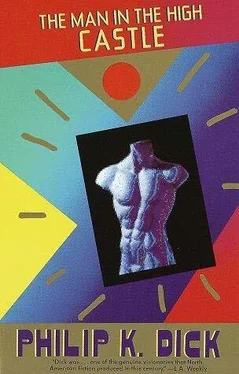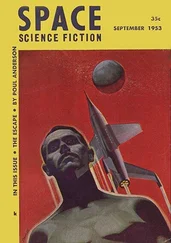“The only book I carry around,” Juliana said, “isn’t actually a book; it’s the oracle, the I Ching –Frank got me hooked on it and I use it all the time to decide. I never let it out of my sight. Ever.” She closed the copy of The Grasshopper . “Want to see it? Want to use it?”
“No,” Joe said.
Resting her chin on her folded arms on the table surface and gazing at him sideways, she said, “Have you moved in here permanently? And what are you up to?” Brooding over the insults, the slanders. You petrify me, she thought, with your hatred of life. But—you have something. You’re like a little animal, not important but smart. Studying his limited, clever dark face she thought, How could I ever have imagined you as younger than me? But even that’s true, your childishness; you are still the baby brother, worshiping your two older brothers and your Major Pardi and General Rommel, panting and sweating to break loose and get the Tommies. Did they actually garrote your brothers with loops of wire? We heard that, the atrocity stories and photos released after the war… She shuddered. But the British commandos were brought to trial and punished long ago.
The radio had ceased playing music; there seemed to be a news program, racket of shortwave from Europe. The voice faded and became garbled. A long pause, nothing at all. Just silence. Then the Denver announcer, very clear, close by. She reached to turn the dial, but Joe stopped her hand.
“… news of Chancellor Bormann’s death shocked a stunned Germany which had been assured as recently as yesterday…”
he and Joe jumped to their feet.
…all Reichs stations canceled scheduled programs and listeners, heard the solemn strains of the chorus of the SS Division Das Reich raised in the anthem of the Partei, the Horst Wessel Lied . Later, in Dresden, where the acting Partei Secretary and chiefs of the Sicherheitsdienst, the national security police which replaced the Gestapo following…”
Joe turned the volume up.
“… reorganization of the government at the instigation of the late Reichsfuhrer Himmler, Albert Speer and others, two weeks of official mourning were declared, and already many shops and businesses have closed, it was reported. As yet no word has come as to the expected convening of the Reichstag, the formal parliament of the Third Reich, whose approval is required…”
“It’ll be Heydrich,” Joe said.
“I wish it would be that big blond fellow, that Schirach,” she said. “Christ, so he finally died. Do you think Schirach has a chance?”
“No,” Joe said shortly.
“Maybe there’ll be a civil war now,” she said. “But those guys are so old now. Göring and Goebbels—all those old Party boys.”
The radio was saying, “…reached at his retreat in the Alps near Brenner…”
Joe said, “This’ll be Fat Hermann.”
“… said merely that he was grief-stricken by the loss not only of a soldier and patriot and faithful Partei Leader, but also, as he has said many times over, of a personal friend, whom, one will recall, he backed in the interregnum dispute shortly after the war when it appeared for a time that elements hostile to Herr Bormann’s ascension to supreme authority—”
Juliana shut the radio off.
“They’re just babbling,” she said. “Why do they use words like that? Those terrible murderers are talked about as if they were like the rest of us.”
“They are like us,” Joe said. He reseated himself and once more ate, “There isn’t anything they’ve done we wouldn’t have done if we’d been in their places. They saved the world from Communism. We’d be living under Red rule now, if it wasn’t for Germany. We’d be worse off.”
“You’re just talking,” Juliana said. “Like the radio. Babbling.”
“I been living under the Nazis,” Joe said. “I know what it’s like. Is that just talk, to live twelve, thirteen years—longer than that—almost fifteen years? I got a work card from OT; I worked for Organization Todt since 1947, in North Africa and the U.S.A. Listen—” He jabbed his finger at her. “I got the Italian genius for earthworks; OT gave me a high rating. I wasn’t shoveling asphalt and mixing concrete for the autobahns. I was helping design. Engineer. One day Doctor Todt came by and inspected what our work crew did. He said to me, “You got good hands.” That’s a big moment, Juliana. Dignity of labor; they’re not talking only words. Before them, the Nazis, everyone looked down on manual jobs; myself, too. Aristocratic. The Labor Front put an end to that. I seen my own hands for the first time.” He spoke so swiftly that his accent began to take over; she had trouble understanding him. “We all lived out there in the woods, in Upper State New York, like brothers. Sang songs. Marched to work. Spirit of the war, only rebuilding, not breaking down. Those were the best days of all, rebuilding after the war—fine, clean, long-lasting rows of public buildings block by block, whole new downtown, New York and Baltimore. Now of course that work’s past. Big cartels like New Jersey Krupp and Sohnen running the show. But that’s not Nazi; that’s just old European powerful. Worse, you hear? Nazis like Rommel and Todt a million times better men than industrialists like Krupp and bankers, all those Prussians; ought to have been gassed. All those gentlemen in vests.”
But, Juliana thought, those gentlemen in vests are in forever. And your idols, Rommel and Doctor Todt; they just came in after hostilities, to clear the rubble, build the autobahns, start industry humming. They even let the Jews live, lucky surprise—amnesty so the Jews could pitch in. Until ‘49, anyhow… and then good-bye Todt and Rommel, retired to graze.
Don’t I know? Juliana thought. Didn’t I hear all about it from Frank? You can’t tell me anything about life under the Nazis; my husband was—is—a Jew. I know that Doctor Todt was the most modest, gentle man that ever lived; I know all he wanted to do was provide work—honest, reputable work—for the millions of bleak-eyed, despairing American men and women picking through the ruins after the war. I know he wanted to see medical plans and vacation resorts and adequate housing for everyone, regardless of race; he was a builder, not a thinker… and in most cases he managed to create what he had wanted—he actually got it. But…
A preoccupation, in the back of her mind, now rose decidedly. “Joe. This Grasshopper book; isn’t it banned in the East Coast?”
He nodded.
“How could you be reading it, then?” Something about it worried her. “Don’t they still shoot people for reading—”
“It depends on your racial group. On the good old armband.”
That was so. Slavs, Poles, Puerto Ricans, were the most limited as to what they could read, do, listen to. The Anglo-Saxons had it much better; there was public education for their children, and they could go to libraries and museums and concerts. But even so… The Grasshopper was not merely classified; it was forbidden, and to everyone.
Joe said, “I read it in the toilet. I hid it in a pillow. In fact, I read it because it was banned.”
“You’re very brave,” she said.
Doubtfully he said, “You mean that sarcastically?”
“No.”
He relaxed a little. “It’s easy for you people here; you live a safe, purposeless life, nothing to do, nothing to worry about. Out of the stream of events, left over from the past; right?” His eyes mocked her.
“You’re killing yourself,” she said, “with cynicism. Your idols got taken away from you one by one and now you have nothing to give your love to.” She held his fork toward him; he accepted it. Eat, she thought. Or give up even the biological processes.
Читать дальше










